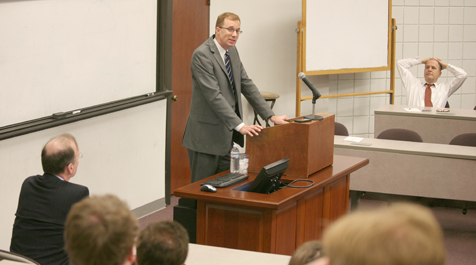Blackstone Lecture Brings Together Shakespeare and Contract Theory
At first glance, one might think that the dramas of Shakespeare and law school casebooks are as dissimilar as two written works can be. But on Feb. 20, Nathan B. Oman, Professor of Law and Tazewell Taylor Research Professor of Law at William & Mary, delivered the 2013-13 Blackstone Lecture and proved that there’s more of the Bar in the Bard than meets the eye.
Oman delivered his lecture, entitled “Shakespeare and the Predicament of Contract Theory,” to a full room of students and faculty, and discussed the vision of contract law presented in Shakespeare’s The Merchant of Venice and its implications for contract theory.
Oman illustrated how The Merchant of Venice is fundamentally a play about contracts and contract theory. In the play, the young nobleman Bassanio borrows money from the Jewish moneylender Shylock, with surety in the form of a pound of flesh, to be provided by Bassanio’s friend Antonio, the titular merchant. Antonio, Oman pointed out, typifies the emerging market culture in the early modern period, as he derives his wealth not from land or assets, but from his relationships with others and interactions through markets.
The concepts of market and contract come together in the play’s climax, when Bassanio defaults and the question arises whether Shylock may collect his pound of flesh.
“In answering this question,” Oman said, “the play offers a particular vision of the normative foundation of contract, one that links the law decisively to the support of commerce.”
Shakespeare does not present Antonio as caught in a moral dilemma hinging on promissory morality, Oman observed, but rather as a merchant subject to the harsh reality of the law from which he derives his wealth. In the end, Antonio escapes, but in a way that preserves the integrity of contract law, which is necessary for market exchange.
Oman pointed out that Shakespeare wrote the play around the time of Slade’s Case, the foundation of the common law of contracts. “The Merchant of Venice and the parallel rise of contract law in commercial society testify to the intimate connection between markets and contract law,” he said.
Oman used this connection between markets and contract as a starting point to explore the normative justifications of both. He considered two dominant accounts of contract law: legal moralism and the law and economics movement, and pointed out the inadequacies of both views: moralism views individual autonomous actors in a vacuum without any context, and efficiency theory ignores the moral implications of markets.
He provided his own view of the normative justification of contract law, arguing that markets have a set of morally desirable outcomes not reducible to efficiency, and that the moral status of markets provides the normative foundation of contract law, which strengthens markets to achieve the moral goods they produce.
Markets are not morally desirable in themselves, Oman asserted, but rather can be desirable for the moral goods they are able to produce: markets allow for free and open exchange by providing a context in which people can cooperate in a pluralistic society, and interaction through markets can make people more cooperative, empathetic, and tolerant of others.
“Rather than focusing solely on the agency of the contracting parties,” Oman said, “we ask ourselves whether or not the market that enforcement would support is morally desirable.” He admitted that markets can cause moral harms by creating inequality and perpetuating injustice on a large scale, but concluded that “markets have moral limits, and these should mark the limits of contract law.”
Nathan Oman has been a professor of law at William & Mary since 2006. Prior to joining the faculty he worked on the staff of Senator Mitch McConnell, clerked for Judge Morris Shepard Arnold of the Eighth Circuit Court of Appeals, and practiced law in Washington, D.C. He is a graduate of Harvard Law School and Brigham Young University, and his areas of expertise include contract law, law and religion, and jurisprudence.
Made possible through the generosity of alumni, the Blackstone Lecture Series has recognized the achievements of younger members of the William & Mary Law School faculty since 1996.
About William & Mary Law School
Thomas Jefferson founded William & Mary Law School in 1779 to train leaders for the new nation. Now in its third century, America's oldest law school continues its historic mission of educating citizen lawyers who are prepared both to lead and to serve.
